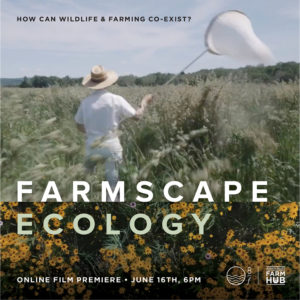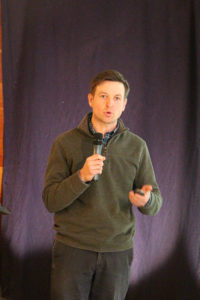Researchers examine the evolving partnership between farming and ecology
(Spanish translation to follow/traducción en español abajo)
At the Hudson Valley Farm Hub, the Applied Farmscape Ecology Program examines the delicate balance of food production co-existing with nature and wildlife. Critical to this process is the navigating of relationships between wildlife, soil microbes, water, plants, and farming.
The primary goal of the program is to examine the semi-natural habitats on and surrounding the farm from the perspective of native species conservation and the provision of biologically-mediated benefits such as pollination and biocontrol to food production. Through research and demonstration, the Farm Hub seeks to generate and share the acquired knowledge with other farms. To achieve this, the Farmscape Ecology team has been working with a variety of researchers throughout the region on individual projects—soil and water quality and turtles to name a few—that aim to add knowledge to farming and ecology.
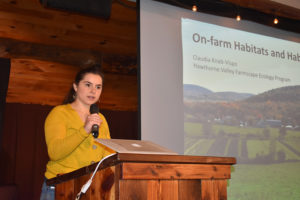
The program has hit some exciting milestones lately including being the subject of a produced by Oceans 8 Films, which features the work of the Applied Farmscape Ecology Program Collaborative’s scientists and researchers. On June 16 the film “Farmscape Ecology” premiered in an online screening and followed by a Q&A and discussion with the researchers in the film and award-winning film director Jon Bowermaster (see sidebar below).
In 2019 the Applied Farmscape Ecology program at the Farm Hub and the Hawthorne Valley Farmscape Ecology Program partnered to launch the Applied Farmscape Ecology Research Collaborative, which includes researchers from the following organizations: Bard College, Hawthorne Valley Farmscape Ecology Program, Hudsonia, SUNY Cobleskill, SUNY New Paltz, the University of New England, and Columbia University. Will Yandik, a farmer and independent researcher, is also part of the Collaborative.
This group includes researchers and scientists in the region whose work addresses the questions, how can on-farm habitat conservation or creation help support regional biodiversity? And, how can such conservation or creation contribute to farm production? Some have already been working with the Farm Hub, while others are new to the group.
This year the Collaborative is working on a number of new projects:
- Noah Perlut, a researcher and professor at the University of New England, will place trackers on Bobolinks at the Farm Hub and monitor their movements in migration as well as their breeding and wintering grounds.
- Sara Kross, a researcher at Columbia University, will look at birds and ecosystem services as a pest control for crops. Kross previously did work with the Wild Farm Alliance in California.
- Will Yandik will work with the production team at the Farm Hub in studying cover crops management as habitat for overwintering birds.
- Carmen Greenwood, a researcher and professor at SUNY Cobleskill, will monitor the connection between soil and invertebrate biodiversity.
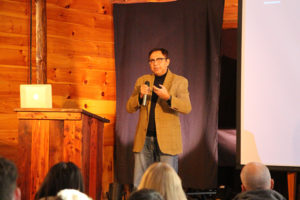
The partnerships have been driven by considering research gaps and “what the needs of the farming community might be,” says Anne Bloomfield, the Farmscape Ecology Program Manager.
While the researchers come from a variety of disciplines including hydrogeology, microbiology, wildlife ecology, entomology, botany, and agriculture, their research all relates to agriculture and seeks to advance conservation efforts.
“The idea behind the Collaborative is that the researchers don’t just operate independently, but that they work collaboratively, and their projects have synergies with one another,” says Bloomfield. Researchers bring their individual expertise in areas such as soil, water, birds, turtles, native meadows and cover cropping. Then, they will work together to create tools and recommendations for growers, with the ultimate goal being to make the knowledge accessible to the community whether it be print, digital or in person.
Engagement
The Farm Hub has also worked with partners to host and organize public events that showcase the research. This year, the Farm Hub is planning the third annual Native Meadow Trial Twilight Meeting, in partnership with the Hawthorne Valley Farmscape Ecology Program. This public event offers demonstrations and hands on activities that are geared towards farmers and land managers. Over the years, Farmscape Ecology has also hosted local birds walks and made presentations at the 2019 Northeast Natural History Conference.
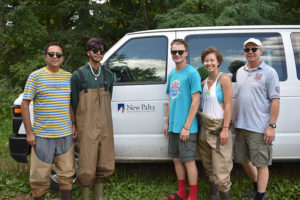
In addition, the research initiatives have provided educational opportunities for students from area institutions. Shafiul Chowdhury, associate professor of SUNY New Paltz department of geological sciences, and a team of his students regularly monitor the water from the Esopus Creek during the spring and summer months. They study the connections between water quality and farming through data collection. Since the program started in 2017, ten undergraduates have participated in the research including students who have received funding from SUNY New Paltz. Chowdhury says: “Our students are getting real life hands-on research experience which will make them better prepared for future a career and graduate school.”
Last November, the Farm Hub hosted a half-day event “Perspectives on Farming with Nature” at The Ashokan Center to showcase existing and ongoing research from the Collaborative.
Presenters introduced their projects and discussed how the research applies to farmers and land managers for biodiversity conservation and crop production.
Farmers face impending challenges in the 21st century including the pressure of feeding an estimated 9 billion people by 2050, according to the UN Department of Economics and Social Affairs. Sustainable agricultural practices “implemented in an ecologically responsible way” are an important part of that solution, says Chowdhury. “Improvements of traditional agricultural practices are necessary to ensure long term sustainability to protect water quality, to maximize water conservation and to minimize the level of adverse effects of irrigation on soil health.”
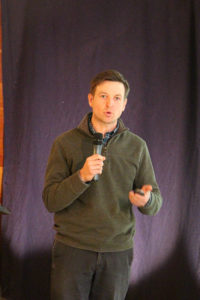
Yandik, a fourth-generation farmer in the Hudson Valley, spoke about the urgency of collaboration.
“There is a growing recognition among practicing farmers that good ecological decisions — cover cropping, providing pollinator habitats, and fostering soil health — yield long-term dividends. The opportunities for farmers and ecologists to collaborate are growing rapidly,” says Yandik.
Moreover, many young farmers under the age of 35 are also first-time farmers and could use advice and experience,” Yandik says. “As market challenges, climate change, and age-old problems with pests and diseases continue to make farming a tough business, we will all benefit from increasing cooperation and the exchange of the newest ideas and research as the Northeast approaches a new era in farming.”
Growers who attended the event say the information was applicable to their work. Among them were Frank Migliorelli and Liza Parker of Hudson Bounty Farm, a family-run fruit and vegetable farm in Red Hook. The conference “opened our eyes to other ways of balancing and managing the land in very interesting and ecofriendly ways,” Migliorelli says.
Parker says she wasn’t aware of the breadth of beneficial insects in agriculture. “This is a level that is hard, but there are takeaways for even the most inexperienced farmer,” she says.
Looking ahead
Research often involves multiyear projects and trials that are repeatedly tested until they are ready to be shared with the public. In the next few years, as the Applied Farmscape Ecology Research Collaborative completes existing projects, tools and resources will be created to make information accessible to the community.
The film “Farmscape Ecology” is now available on our website. Click here to view it.
To view the livestreamed videos in full and review the presentations at “Perspectives on Farming with Nature,” the November 16 event that we hosted at The Ashokan Center click here.
–Amy Wu
“Farmscape Ecology” film premieres
New film highlights research within Applied Farmscape Ecology Program
On June 16th, the Farm Hub hosted a virtual film premiere of the new short film “Farmscape Ecology.”The screening was followed by a panel discussion moderated by Anne Bloomfield, Farmscape Ecology Program Manager, and interpreted by the Farm Hub’s Language Justice team.
Speakers included filmmaker Jon Bowermaster, Andrew Casner of the Farm Hub, Conrad Vispo and Claudia Knab-Vispo of Hawthorne Valley Farmscape Ecology Program, Shafiul Chowdhury from SUNY New Paltz, Erik Kiviat from Hudsonia, and Gabriel Perron of Bard College. Radio Kingston provided technical assistance for the event.
To read about the Applied Farmscape Ecology Program click here.
To read about the work of the Applied Farmscape Ecology Research Collaborative click here.
This is the third film that the Farm Hub has made with Oceans 8 Films as part of Bowermaster’s “Hope on the Hudson” series. The others are “Seeds of Hope” and “Growing with the Grain.”
The film also had its world premiere at the 2020 Environmental Film Festival, a leading film festival in Washington D.C.
Applied Farmscape Ecology Presentations
| English | Spanish |
| Applied Farmscape Ecology Program | Programa Aplicado de Ecologia del Agro-Paisaje |
| cover crops | coberturas |
| microbial diversity | diversidad microbiana |
| wasp | avispa |
| honeybee | abeja |
| bumble bee | abejorro |
| dam | represa |
| hedgerow | barrera vejetal |
| wetland | humedal |
| strain | cepa |
| swab | hisopado; muestra; hisopo |
| no till | sin labranza |
| avian | aviar |
| caterpillar | oruga |
| birdflock | bandada de pajaros |
INVESTIGADORES EXAMINAN EVOLUCIÓN DE LA RELACIÓN ENTRE LA AGRICULTURA Y LA ECOLOGÍA
Haga clic aquí para el Glosario en inglés y español de las presentaciones de la investigación.
En Hudson Valley Farm Hub, el Programa Aplicado de Ecología del Agro-Paisaje examina el delicado equilibrio de la producción de alimentos que coexiste con la naturaleza y la vida salvaje. De crucial importancia para este proceso es la navegación de las relaciones de la vida salvaje, los microbios del suelo, el agua, las plantas y la agricultura.
La meta principal del programa es examinar los hábitats naturales en y alrededor del rancho desde la perspectiva de la conservación de especies autóctonas y la provisión de beneficios como la polinización y el control biológico de la producción de alimentos. A través de la investigación y la demostración, Farm Hub busca generar y compartir el conocimiento adquirido con otros ranchos. Para lograr esto, el Equipo de Ecología del Agro-Paisaje ha estado trabajando en distintos proyectos individuales con una variedad de investigadores a lo largo de toda la región –por ejemplo, la calidad del suelo y el agua, las tortugas, entre otros– que tienen como propósito sumar conocimiento a la agricultura y la ecología.
Últimamente, el programa ha marcado una serie de hitos que incluyen ser el sujeto de una producción de Oceans 8 Films que presenta el trabajo de científicos e investigadores del Colaborativo. El 16 de junio, se estrenó la película “Farmscape Ecology” (“Ecología del agro-paisaje”) en una proyección por internet, seguida de una sesión de preguntas y respuestas y una conversación con los investigadores de la película y Jon Bowermaster, el galardonado director de cine (véase la barra abajo).
En 2019, el Programa Aplicado de Ecología del Agro-Paisaje colaboró con el lanzamiento del Colaborativo de Investigación Aplicada de Ecología del Agro-Paisaje, el cual incluye investigadores de las siguientes organizaciones: Bard College, el Programa de Ecología del Agro-Paisaje de Hawthorne Valley, Hudsonia, SUNY Cobleskill, SUNY New Paltz, la Universidad de New England y la Universidad de Columbia. Will Yandik, agricultor e investigador independiente, también es parte del Colaborativo.
Este grupo incluye investigadores y científicos de la región cuyo trabajo aborda las preguntas: ¿Cómo puede la conservación o creación de hábitats en el rancho apoyar la biodiversidad regional? ¿Y cómo puede dicha conservación o creación contribuir a la producción del rancho? Algunos llevan tiempo trabajando con Farm Hub, mientras que otros son recién llegados al grupo.
Este año, el Colaborativo está trabajando en una serie de proyectos nuevos:
- Noah Perlut, investigador y profesor de la Universidad de New England, colocará rastreadores en charlatanes (chambergos) en Farm Hub y monitoreará sus movimientos migratorios, al igual que los lugares donde se reproducen e invernan.
- Sara Kross, investigadora de la Universidad de Columbia, estudiará servicios de aves y ecosistemas, como el control de plagas en los cultivos. Kross trabajó previamente con Wild Farm Alliance en California.
- Will Yandik trabajará con el Equipo de Producción de Farm Hub para estudiar el manejo de coberturas como hábitats donde invernan aves.
- Carmen Greenwood, investigadora y profesora de SUNY Cobleskill, monitoreará la conexión entre el suelo y la biodiversidad de invertebrados.
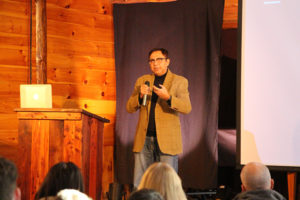
Las colaboraciones han estado dirigidas por la consideración de vacíos investigativos y “cuáles podrían ser las necesidades de la comunidad agricultora”, dice Anne Bloomfield, gerente del Programa de Ecología del Agro-Paisaje.
Aunque los investigadores vienen de una variedad de disciplinas que incluyen la hidrogeología, microbiología, ecología de la vida salvaje, entomología, botánica y agricultura, su investigación se relaciones enteramente con la agricultura y busca impulsar esfuerzos de conservación.
“La idea detrás del Colaborativo es que los investigadores no solo operan independientemente, sino que trabajan colaborativamente y sus proyectos tienen sinergias entre sí”, dice Bloomfield. Los investigadores aportan su experiencia individual en áreas como el suelo, el agua, las aves, las tortugas, los prados autóctonos y las coberturas. Entonces, trabajarán juntos para crear herramientas y hacer recomendaciones para los productores, con la meta principal de hacer que el conocimiento sea accesible para la comunidad de forma impresa, digital y/o en persona.
Participación
Farm Hub también ha trabajado con aliados para ofrecer y organizar eventos públicos de exhibición de la investigación. Este año, Farm Hub está planificando la tercera Native Meadow Trial Twilight Annual Meeting (Reunión Anual al Atardecer sobre las Pruebas Experimentales de Prados Autóctonos), en colaboración con el Programa de Ecología del Agro-Paisaje de Hawthorne Valley. Este evento público ofrece demostraciones y actividades prácticas dirigidas a agricultores y administradores de tierras. Con los años, la Ecología del Agro-Paisaje también ha ofrecido caminatas de observación de aves locales y presentado en la Conferencia de Historia Natural del Noreste 2019.
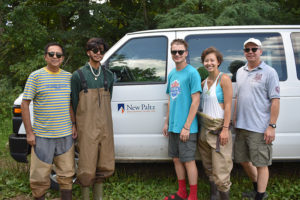
Además, las iniciativas de investigación han brindado oportunidades educacionales a estudiantes de instituciones del área. Shafiul Chowdhury, profesor asociado del Departamento de Ciencias Geológicas de SUNY New Paltz, y un equipo de sus estudiantes monitorean regularmente el agua proveniente de Esopus Creek durante los meses de primavera y verano. Estudian las conexiones entre la calidad del agua y la agricultura a través del recogido de datos. Desde que el programa comenzó en 2017, diez estudiantes subgraduados han participado en la investigación, incluso estudiantes que han recibido fondos de SUNY New Paltz. Chowdhury dice: “Nuestros estudiantes están pasando por experiencias de investigación práctica que los prepararán mejor para una futura carrera y estudios graduados”.
El pasado mes de noviembre, Farm Hub fue anfitrión de un evento de medio día, “Perspectives on Farming with Nature” (“Perspectivas sobre Cultivar con la Naturaleza”) en The Ashokan Center para mostrar investigaciones existentes y continuas del Colaborativo.
Los presentadores presentaron sus proyectos y hablaron de cómo la investigación aplica a agricultores y administradores de tierras para la conservación de la biodiversidad y la producción de cultivos.
Los agricultores enfrentan retos inminentes en el siglo 21 que incluyen la presión de alimentar a una cantidad estimada de 9 mil millones de personas para el año 2050, según el Departamento de Economía y Asuntos Sociales de la ONU. Las prácticas de agricultura sustentable “implementadas de forma ecológicamente responsable” son parte importante de esa solución, dice Chowdhury. “Es necesario mejorar las prácticas agrícolas tradicionales para asegurar una sustentabilidad a largo plazo con el fin de proteger la calidad del agua, maximizar la conservación del agua y minimizar el nivel de los efectos adversos de la irrigación en la salud del suelo”.
Yandik, un agricultor de cuarta generación en Hudson Valley, habló de la urgencia de colaborar.
“Cada día hay más reconocimiento entre quienes practican la agricultura de que las buenas decisiones ecológicas –usar coberturas, proveer hábitats para polinizadores y promover la salud del suelo– resultan en dividendos a largo plazo. Las oportunidades de colaboración para agricultores y ecologistas están aumentando rápidamente”, dice Yandik.
Asimismo, muchos agricultores jóvenes, menores de 35 años, son también agricultores por primera vez y pueden beneficiarse de consejos y experiencia”, dice Yandik. “Mientras los retos del mercado, el cambio climático y viejos problemas de plagas y enfermedades continúen haciendo de la agricultura un negocio difícil, todos nos beneficiaremos de una mayor cooperación y del intercambio de las últimas ideas e investigaciones, a la par de que el Noreste entra en una nueva era de agricultura”.
Los productores que asistieron al evento dicen que la información se podía aplicar a su trabajo. Entre ellos estuvieron Frank Migliorelli y Liza Parker de Hudson Bounty Farm, un rancho de frutas y vegetales administrado por una familia de Red Hook. La conferencia “abrió nuestros ojos a otras formas de balancear y manejar las tierras en formas muy interesantes y ecológicas”, dice Migliorelli.
Parker dice que no conocía la amplia gama de insectos beneficiosos en la agricultura. “Este es un nivel difícil, pero hay lecciones que aprender hasta para el agricultor con la menor cantidad de experiencia”, dice ella.
Con miras hacia el futuro
La investigación a menudo implica proyectos y experimentos de múltiples años que son puestos a prueba repetidamente hasta que están listos para ser compartidos con el público. En los próximos años, a medida que el Colaborativo de Investigación Aplicada de Ecología del Agro-Paisaje completa proyectos existentes, se crearán herramientas y recursos con el propósito de que la información sea accesible para la comunidad.
La película “Farmscape Ecology” está disponible en nuestro sitio web. Haga clic aquí para verla.
Y para ver todos los videos grabados en vivo y reseñar las presentaciones de “Perspectives on Farming with Nature”, el evento del 16 de noviembre que tuvimos en The Ashokan Center, haga clic aquí.
–Amy Wu
Se estrena la película “Farmscape Ecology”
NUEVA PELÍCULA MUESTRA LA INVESTIGACIÓN DEL PROGRAMA APLICADO DE ECOLOGÍA DEL AGRO-PAISAJE
El 16 de junio, Farm Hub presentó el estreno virtual del nuevo corto titulado “Farmscape Ecology” (“Ecología del agro-paisaje”). Después de la película, hubo un panel moderado por Anne Bloomfield, gerente del Programa de Ecología del Agro-Paisaje, e interpretado por el Equipo de Justicia de Lenguaje de Farm Hub.
Los panelistas incluyeron al cineasta Jon Bowermaster, Andrew Casner de Farm Hub, Conrad Vispo y Claudia Knab-Vispo del Programa de Ecología del Agro-Paisaje de Hawthorne Valley, Shafiul Chowdhury de SUNY New Paltz, Erik Kiviat de Hudsonia y Gabriel Perron de Bard College. Radio Kingston brindó asistencia técnica durante el evento.
Para leer acerca del Programa Aplicado de Ecología del Agro-Paisaje, haga clic aquí.
Para leer acerca del trabajo del Colaborativo de Investigación Aplicada de Ecología del Agro-Paisaje, haga clic aquí.
Esta es la tercera película que Farm Hub ha hecho con Oceans 8 Films, como parte de la serie “Hope on the Hudson” (Esperanza en el Hudson”) de Bowermaster. Las otras son “Seeds of Hope” (“Semillas de esperanza”) y “Growing with the Grain” (“Creciendo con el grano”).
La película también se estrenó en el festival de Cine Ambiental 2020, un festival de cine de vanguardia celebrado en Washington D.C.

